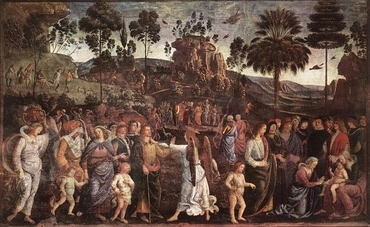6948. 'And He said, Throw it to the earth. And he threw it to the earth' means an influx of the power of the Lord's Divine Natural into the sensory level. This is clear from the meaning of 'rod' as power in the natural, and - when used in reference to the Lord - as the power emanating from His Divine Natural, dealt with immediately above in 6947; from the meaning of 'throwing', or sending forth, as emanating, which is influx; and from the meaning of 'the earth' as the external part of the human mind, dealt with in 82, 917, 1411, 1733, here the sensory and bodily levels of it, which are the most external, for the rod was made into a serpent and 'a serpent' means the sensory and bodily levels of a person's mind.
[2] By the Lord's Divine power one should here understand Divine Truth emanating from the Lord, for power resides within Divine Truth to such an extent that it is power itself, 3091, 4931, 6344, 6423. Divine Truth emanating from the Lord flows into every person by way of his interiors into his exteriors, right down into the external sensory and the bodily levels, and everywhere it flows it stirs to life things attuned to it in their proper order - on the sensory level things attuned to it such as appear in the world around and on earth. But things that exist in the world around and on earth are different in appearance from what they really are, and so they are full of illusions. When therefore the sensory level relies solely on those appearances 1
the thought which takes place there is inevitably opposed to any good or truth of faith because that thought is based on illusions, and when Divine Truth flows in the sensory level turns it into falsity. The fact that a person's thought is based on illusions if he does not rise above the sensory level but confines himself to that Level and thinks on it can be demonstrated by the following examples:
[3] There are for instance illusions regarding a person's life - that it belongs essentially to the body, when in fact it belongs to the spirit within the body. There are illusions about sight, hearing, and speech - that they belong to the eye, ear, tongue and mouth, when in fact the spirit is what sees, hears, and speaks, through those organs of the body. Then there are illusions about life - that it is innately present in a person, when in fact it flows into him; and illusions about the soul - that it is unable to exist within a human form, or to have human senses and affections. There are also illusions about heaven and hell - that the one is above a person and the other beneath, when in fact they are within him; illusions that there is an influx from objects to interior things, when in fact what is external does not flow into what is internal, but what is internal into what is external; illusions about life after death - that it is not possible without the presence also of the physical body; not to mention illusions involving natural phenomena which lead to conflicting conjectures made by so many people.
[4] Can anyone fail to see the predominance of illusions and consequently of falsities over truths simply from the dispute that had gone on for a long time about the circulation of the blood, which in spite of so much convincing evidence nevertheless remained open to doubt for a long time? That predominance of illusions may also be recognized from the dispute about the sun, that it revolved each day around this earth, and not only the sun but also the moon, all the planets, and the whole starry sky, and from the dispute which continues to exist regarding the soul - how it is joined to the body, and where it is seated there. When the illusions of the senses prevail in such matters, even though the true nature of these is evident from so many phenomena and effects, how much more will they prevail in the kinds of things that belong to heaven, which, being spiritual ones, do not make themselves plain except by means of correspondences?
[5] From all this one may now see what the sensory level of a person's mind is like regarded in itself and left to itself - that it is full of illusions and consequently falsities and so is opposed to the truth or good of faith. This is why when a person does not rise above the sensory level and sees things in the inferior light which shines on that level he is completely in the dark so far as things belonging to the spiritual world are concerned, that is, things which dwell in light from the Divine. And that inferior light on a sensory level is turned into thick and utter darkness when light from heaven penetrates it. The reason for this is that truths which belong to Divine light cannot exist together with illusions and consequent falsities; it snuffs them out and in so doing causes thick darkness.
Footnotes:







